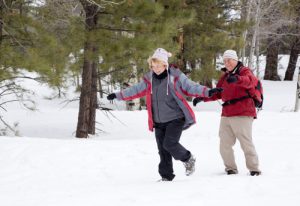 If you regularly monitor your blood pressure, you may have noticed more spikes. You may be puzzled by this because you are adhering to a healthy lifestyle and taking your medication regularly, but there is another reason why your blood pressure isn’t being well controlled as of late. It’s because it’s winter.
If you regularly monitor your blood pressure, you may have noticed more spikes. You may be puzzled by this because you are adhering to a healthy lifestyle and taking your medication regularly, but there is another reason why your blood pressure isn’t being well controlled as of late. It’s because it’s winter.
You see, then the temperature drops your blood pressure could rise. This is because when it’s cold outside, your blood vessels become stiffer and less flexible, meaning that your blood is hitting your blood vessels walls much harder. Furthermore, blood vessels can narrow in colder temperatures, contributing to higher blood pressure. When blood pressure remains high over a period of time, then damage can occur, which increases your risk of heart disease, heart attack, and stroke.
Advertisement
Cardiologist Dr. Ragavendra Baliga explained, “Outdoor temperature is a major determinant of the observed seasonal fluctuations in blood pressure, with higher and lower blood pressure in winter and summer, respectively.”
But how much does blood pressure rise when it’s cold? It’s hard to say exactly, but it depends on a few variables including temperature, wind chill, duration of exposure to cold weather, and a person’s overall health. The researchers found that individuals exposed to 52 Fahrenheit (11 Celsius) for at least five minutes is enough to cause significant changes in blood pressure.
Cold weather affecting blood pressure isn’t just something that affects the elderly. The researchers found that it can affect persons of all ages, but its effects are generally worse on older adults.
Professor Dr. Lu Shi said, “In general, [blood pressure in older people] is already higher than those of the younger people, so a drop in temperature is more likely to elevate [an older person’s] blood pressure over the threshold level.”
Advertisement
Dr. Nieca Goldberg concluded, “For people who have heart disease and those who are being controlled on blood pressure medicine, if they go out in extremely cold temperatures like blizzards or decide to shovel the snow, they may start to experience symptoms like shortness of breath and chest tightness.”
It’s important that during the winter months, you are staying as warm as possible. If you do need to head outdoors, then ensure you are properly dressed so you retain heat and avoid being exposed to cold temperatures for prolonged periods of time.
Related: 12 simple tips to protect your joints this winter
